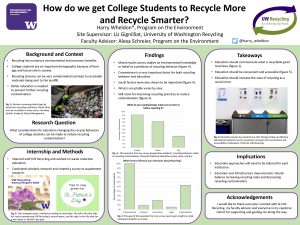How Can We Educate College Students to Recycle More And Recycle Smarter?
Increasing the rate of recycled waste has great environmental and economic benefits by reducing waste sent to landfills, conserving natural resources, and decreasing energy consumption. Education is a valuable tool to increase recycling rates, with college students as an important demographic to target due to their age range and future position in society; however, there is still room for improving recycling rates and reducing waste stream contamination. Preventing contamination is key, as an overly contaminated recycling stream can be too difficult to recycle and is sent to the landfill instead. The purpose of this study was to gain an understanding of the recycling behaviors and motivations of college students to inform the creation of effective recycling education. To achieve this goal, I conducted an internship with University of Washington Recycling and worked on waste reduction education materials targeted at college students. I also researched academic sources on the recycling behaviors of college students, which was supplemented with an anonymous survey distributed to college students predominantly from UW. The study findings suggest that educational approaches should focus on factors of convenience and waste stream contamination, with potential considerations regarding environmental belief and peer or social factors. Ensuring college students understand what is legally recyclable locally and how to recycle are key points in increasing the convenience of recycling and reducing waste stream contamination. Furthermore, levels of infrastructure, funding, and local recycling capabilities vary by university, so each recycling education program will likely need to be tailored to fit those respective conditions.
